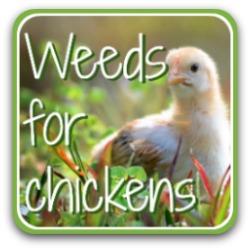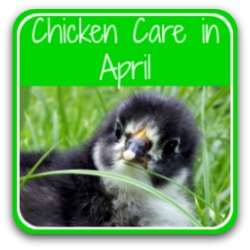Animal husbandry: how to keep your chickens fit and healthy.
Keeping the flock disease-free is one of the main aims of any responsible chicken keeper.
Here, I look at what animal husbandry means for backyard flocks and 5 simple things you can do now to keep yours safe from infections.
"Prevention is better than cure" - a phrase we've all heard of. In the case of chickens, it's even more critical than for some other species.
Why? Because chickens are programmed not to show they're ill. If they do, they stand to be bullied by the rest of the flock and taken by predators.
So by the time it's obvious they're unwell, it can be too late to do anything about it. Add to that the fact that many veterinarians aren't skilled in poultry medicine and you have a real problem.
The best way to solve it? Good husbandry.
What is animal husbandry?
Let's start at the beginning. Animal husbandry is simply the breeding, feeding, housing and general health care of livestock to make sure they have a long, active and productive life.
Much of it is common sense. Giving animals a safe environment, making sure they have nutritious food and taking care of their well-being is something all responsible backyard chicken keepers would aspire to.
So let's look at the top 5 most important things you can do to maintain your flock's health.
If you purchase a product through links on this page, I receive a small commission at no extra cost to you. My integrity and your satisfaction are very important to me, so I only recommend products I have purchased or would purchase myself and which I believe would benefit you. To learn more please see my affiliates disclosure policy.
1. Top priority: keep rats, mice and wild birds away.
Rats and mice: As well as being generally unpleasant to have around the chicken house, rats and mice carry disease into your flock. Contact with infected rodent faeces in urine and droppings can lead to your chickens contracting salmonellosis and leptospirosis - the cause of Weil's Disease in humans.
Wild birds: You'll have heard of "bird flu", also known as "avian influenza(1)". It's a highly contagious virus which can cause untold damage to poultry, including organ damage and death. Very rarely, it can also be transmitted to humans.
Bird flu is spread through the infected droppings and saliva of wild birds. Perfectly healthy chickens become infected when they come into contact with infected droppings or saliva, and can then transmit the disease through their own flock.
The more contagious strains can sweep through a flock and kill every bird in just over a day. It's led to the destruction of thousands of poultry flocks all over the world both through flock contagion and through mass culling of infected birds.
How are these two species - rodents and wild birds - connected?
Grain.

Rats have an amazing sense of smell. They'll be attracted to grain instantly - and they can get into containers through the smallest of holes.
Wild birds? Well, you only have to look out of your window. Particularly at times when naturally occurring foods like berries are scarce, you'll have dozens of birds attracted to those pretty feeders you have on your lawn.
And if your chicken feeders happen to be open? Wild birds won't know they're not supposed to take that grain. They'll eat whatever's on offer.
Rats, mice and birds: the good husbandry solution.
It's hard to keep wild birds away from your chicken run, but you can protect the grain. Make sure your feeders and storage units are secure. Plastic won't do - rats will chew through it very quickly. Choose metal every time - and make sure it has a secure lid.
Feeders with open dishes are like feeding stations to both birds and rodents. Invest in an automatic feeder which opens only when your chickens make it, and at other times keeps the grain safely shut away.
I bought this one after a massive problem with rats, and have never had a rat invasion since.
2. Isolate new additions.
Adding in new hens to your existing flock? Wherever you buy them from - whether at auction or market, from a store or from a trusted friend - always isolate them.
And by isolate, I mean keep them away from the rest of the flock entirely for at least the first two weeks after you bring them home.
You don't know, even with a friend, what problems there may have been with the flock the hens have come from, and chickens are good at hiding illness until they're very ill indeed.
So it may take a couple of weeks for any signs of disease to become apparent. Once that time has passed you can be relatively sure the new additions won't bring disease into your existing flock.
New additions to the flock: the good husbandry solution.
See this page for a detailed article about how and when to isolate chickens from the rest of the flock.
A dog crate placed inside an outbuilding or garage works well for one or two hens. Make sure you only buy as many as you can safely accommodate for that period.
For more than that, I use a puppy playpen, which doubles as a DIY brooder box when I'm hatching new chicks. I have the taller one to prevent either hens or chicks flying out, without having to put a top on it.
Here it is, doubling as a chick brooder in a short video I made.
As you'll see, it's easy with this style to make it bigger as the chicks grow, as well as to hang water bottles or treats. And it's large enough to add in two or three water and feed stations and place small logs for added interest.
I also like the fact that it has a door I can go in and out of. If you decide to buy one, make sure to select the door option.
Anyway – back to good husbandry!
Handle your new chickens daily for signs of disease or infestation such as lice or mites. Watch for pale combs, discharge from the eyes, ears or mouth, coughing or weight loss.
Once two weeks have passed, begin introducing your new additions to the existing flock by placing the crate into your run. Let the two parties see, hear and smell each other - but don't mix them for another week or so.
3. Keep water clean.
Chickens can go for as long as a week without food (although they should, of course, have food available every day). But without drinking water, they'll die in a matter of a couple of days - less if conditions are hot.
It has to be the "right kind" of water, though. Which means it has to be clean.
But wait! "My chickens always drink from muddy pools!"

It's true - chickens will take water from wherever they can get it, especially when the weather is hot and they need to keep hydrated.
But they also need a source of clean water - and they will always choose the clean over dirty if given the choice.
Dirty water is known to carry a host of bacterial infections, many of which can lead not to just serious illness in the flock, but to death.
They include bacterial illnesses like chronic respiratory disease and avian cholera, virus-borne diseases such as Newcastle disease, infectious bronchitis and the dreaded Marek's, and disease caused by protozoa, including Coccidiosis.(1)
And because generally there is one water source for many chickens, contaminated water will spread those diseases through a flock very quickly.
Clean water: the good husbandry solution.

For chicks, use something like the brooder bottle caps (you can see them in action in my video, above) which keep the water away from poop.
They fit directly onto ordinary plastic water bottles - a great way to recycle!
For your adult flock, if you use a static waterer keep it in the shade and change its water every day - more in hot weather.
Clean it at least once a week. If it's plastic, add 20 mls of organic apple cider vinegar per litre of water. For chicks, reduce this to 5 mls per litre. It will help keep the container clean and will also help keep your chickens' guts healthy.
Do not do this if it's a metal container - it will corrode.
Personally, I use a static waterer positioned at the far end of my run in the summer months when the chickens need more water.
4. Keep the coop clean.
Flies. Ugh. Known carriers of organisms associated with food poisoning in humans including Salmonella, e-Coli and Listeria .
In chickens, they're the cause of diseases like Newcastle disease, e-Coli and Caronavirus. And don't even mention "Fly Strike" (Myiasis), where fly maggots take up residence in a hen...
Flies thrive on three main things: warmth, moisture and dirt - particularly faeces. But did you know that flies will also breed in spilled grain? Particularly if it's wet.
So chicken coops can be great breeding grounds. Straw bedding. Poop, which makes the bedding moist. Spilled water, spilled grain, old uneaten treats...
Using insecticides like fly spray in the coop is not a good idea. Spraying chemicals within a confined space can be bad for your own health and certainly won't help chickens' respiratory problems.
Clean coops: the good husbandry solution.
1. Keep flies away.
Easier said than done, especially in the summer months. But they can be controlled by...
- Keeping your bedding clean. If you use the deep litter method, turn it frequently, especially if your chickens don't. Using sand? Keep it clean by scooping the poop at least once every day. It takes seconds but has major benefits.
- Consider using construction sand as bedding, at least in the summer. I wasn't sure about this until we tried it and now, although I revert to the deep litter method in winter, I wouldn't have anything else in the hot summer months.
- It keeps the coop noticeably cooler and dries out the poop. Both those things mean fewer flies - far fewer. And the hens love it...
 Use sand to your summer coop - it gives chickens an ideal dust bathing area and keeps flies away at the same time!
Use sand to your summer coop - it gives chickens an ideal dust bathing area and keeps flies away at the same time!- Collect eggs regularly. Any left may be pecked and the delicious smell will attract those flies.
- Clear up left-over treats. Don't leave them lying around the coop or the run.
2. Got flies? Get rid!
If you keep the coop clean and free from moisture, you'll have far fewer flies. What to do with those you do get?
- Many people swear by a very simple, old-fashioned solution - hanging fly papers in the coop. Personally, I don't like them but there's no denying their effectiveness. Make sure you hang them out of reach of your chickens, though.
- Lemongrass: Citronella, the scent used in many insect repellents, occurs naturally in lemongrass so it keeps all insects, including mosquitoes (which can bring their own problems for chickens), at bay. It's so easy to grow, even I can do it!
- I grew tons of it from seed and placed it in planters outside my coop doors and at strategic points in the chicken run, providing some shade where the hens like to sunbathe.
 Another benefit of lemongrass - it tastes great with fish dishes, and makes a lovely herbal tea!
Another benefit of lemongrass - it tastes great with fish dishes, and makes a lovely herbal tea!- I have a very detailed article about how to keep flies away from your coop, here.
5. Offer healthy treats, in moderation.
Of course, a good quality food is essential to chicken health, as is a ready supply of grit and oyster shell.
What about treats for chickens, though? We all like to spoil our chickens. But too much of a good thing can equal illness and potentially death for chickens. Yep, believe it or not, there's such a thing as an obese chicken...
Too many of the wrong kinds of treat are just as bad for chickens as they are for children. One of the main causes of Sudden Chicken Death Syndrome is fatty liver - caused by too much glucose. That's too many treats of the wrong kind.
And "broiler" chickens, bred to put on meat and weight very quickly, are unable to stand by the age of 14 weeks - their rapid growth is just too much for their bones to take.
The death rate for broiler chickens is 7 times higher than for laying hens fed healthily.
Treats: the good husbandry solution.
- Offer treats, by all means, but make them healthy ones. And even then, not too many and not too often.
- This frozen salad treat is ideal in the heat of the summer - keeps the flock hydrated, too.
 Give your flock some healthy treats - this frozen salad is ideal in the heat of summer.
Give your flock some healthy treats - this frozen salad is ideal in the heat of summer.- Make sure the treats you give your chickens are rationed. In exactly the same way as you wouldn't allow your kids to eat the contents of the sweetie shop (because you wouldn't, right?), don't give your chickens too much of a good thing.
- Save high protein treats for times when your flock really needs them - times of stress like moulting, after a predator attack or during the freezing days of a hard winter.
- Make sure your chickens get some time to forage for their own food, even if that's just scratching round in the run for worms and bugs. Exercise is just as much needed in hens as in humans!

More ideas to keep your flock healthy!
Sources.
Amaral, Dr L. A. : Drinking water as a risk factor to poultry health. Pub. Brazilian Journal of Poultry Science, 2004.
Loftin, Dr K. M: Biology and control of flies in poultry facilities. Pub. University of Arkansas, Division of Agriculture, 2014.
World Health Organisation: Avian Influenza. Pub. 2018.
















